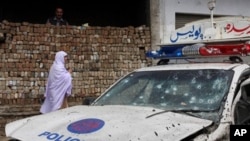A top U.S. military official traveled to Pakistan Thursday, a day after the release of a U.S. report slamming Pakistan for what it calls failed efforts in the counterinsurgency against Islamic radicals.
General Mattis, chief of US Central Command - which heads up US military efforts for the entire region - discussed bilateral military cooperation with Pakistani Army chief Ashfaq Parvez Kayani at a time when the relationship between the two countries is strained by several events, most recently a report this week criticizing Pakistan’s counterinsurgency efforts.
The United States considers Pakistan key to its efforts to stabilize Afghanistan and defeat al-Qaida. Over the past decade, it has supplied Pakistan with military and other aid to stop the Taliban and other militants from using the country as a safe haven.
But this week's White House report criticizes those efforts, charging that Pakistan has no clear path towards defeating the insurgency in the border areas near Afghanistan.
Pakistan Foreign Ministry Spokeswoman Tasmeena Janjua rejected the report's findings.
"We have seen the report that has been issued by the U.S. administration to the Congress," said Janjua. "We realize that the report reflects a certain point of view on some very difficult issues. It, of course, reflects the U.S. point of view. I would emphatically state that we do not share the assessment of the U.S."
The White House report accuses Pakistan of not following through when targeting militant strongholds. The report claims the Pakistani military takes territory ,but falls short of completely securing the area, creating a power vacuum that allows the insurgents to return when the army moves out.
Brigadier General Mahmood Shah is a former chief of Pakistani forces in the tribal areas. He says there is some truth to this criticism, but that still does not give the United States the right to issue orders to another country’s military.
"I would say that I agree with the report when it comes to the country Pakistan lacks a comprehensive counter-terrorism strategy," said Shah. "I would agree to this. Trying to micromanage the technical details as to where and when the Pakistan army carries out an operation, probably I would disagree with this."
But the general also pointed out that there are a number of other legitimate counter-criticisms from the Pakistani establishment.
Many here say that the White House is scapegoating Pakistan for U.S. failings in Afghanistan.
Others point to the need for the U.S. to provide certain sensitive assistance to the Pakistani military, including handing over drone technology so that the Pakistan can run its own drone mission.
But perhaps greater than anything else is the belief by many in Pakistan that they have sacrificed a great deal in the global fight against terrorism.




